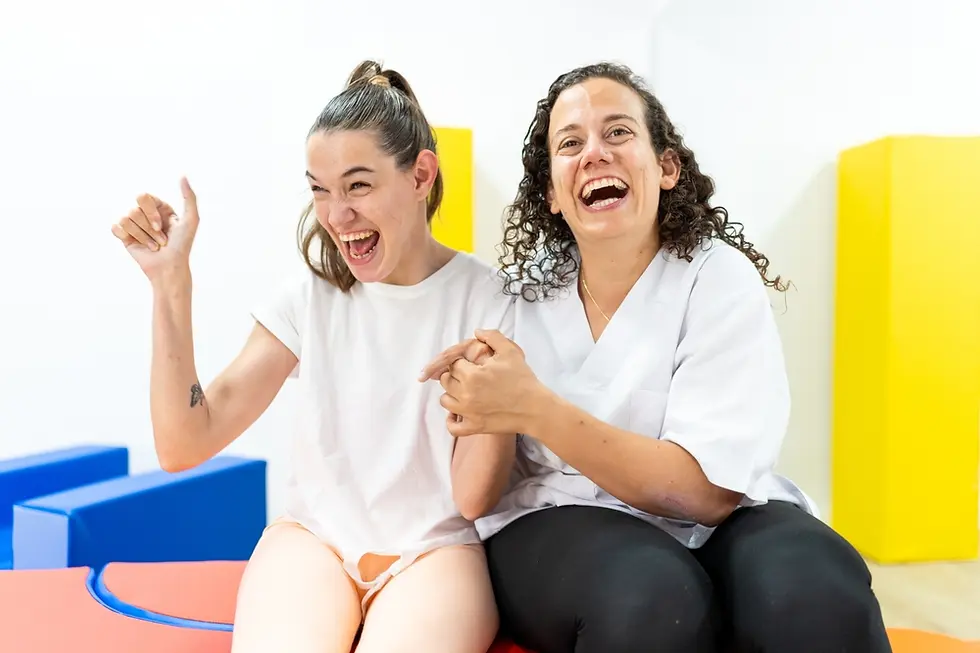What is Autism and what are the signs of Autism?
- Tibii Team

- Apr 10, 2022
- 3 min read
Updated: Jul 16, 2025
Autism Spectrum Disorder (ASD) is a development disorder, whereby there is a neurodiversity present. Some people will have ASD alongside a genetic condition; whilst others may have other neurological conditions present. We have much to learn about the cause of ASD, at present there is no known cause, however, science is evolving daily to explore this further.
To better understand ASD, it can be helpful to be aware of some of the signs and characteristics that people may present with. Though, it is important to note that ASD looks different for everyone.
Problems of children with autism are generally divided into two categories:
problems in social communication and activities,
Problems in movements, and behaviors.
The signs and symptoms that we will examine in detail below are a subset of these two cases.

Children with autism may have different ways of learning, moving, keeping attention, expressing, and regulating emotion. It is important to keep in mind that those without autism disorder can also have some of these symptoms. Although, for those with ASD these symptoms can have a significant impact on their everyday life.
It can be overwhelming as a parent if you observe your child exhibiting characteristics of autism. If you have any concerns regarding behaviors making an appointment with your GP can be a good place to start. From there your GP can complete a referral to have a thorough assessment completed. Usually, these assessments can be completed from the age of 2, however, many children do not get their diagnosis until much later in life, sometimes not until they are an adult.
Once there is a diagnosis in place, connection to allied health and support services can be made to provide support for the whole family. The important point that families need to understand is despite one or two symptoms, the child is not the cause of autism. if you see problems in your child, do not worry at all
Some children with autism disorder may struggle in their verbal communication with those around them, or only be able to communicate with parents/ caregivers and those they trust most. This can mean that at times they can struggle to connect with peers and form friendships. They may have difficulties with making eye contact or not know the appropriate social cues for a particular interaction resulting in them laughing at a classmate when they hurt themselves not understanding that it is an inappropriate response that is hurtful to the peers’ feelings.
Additionally, they can have barriers connecting with their peers as they may have some challenges in using their imaginations as they can be pragmatic, therefore imaging that there is a dragon in their bedroom can be outright ridiculous to them.
Children with autism disorder may not be able to follow the hints. For example, if someone points to something with their hands and eyes, the autistic child cannot pursue that object or goal. he/she only looks at that person or does not pay any attention at all.
Autistic children may not have any interest or desire to show their toys or interesting objects to others. While we see this behavior in small children without ASD which have the excitement to show the new toy to those around. when something interesting, such as an insect on the ground or a plane in the sky, children without ASD are interested and show it to those around them with excitement and enthusiasm, while we may not see these behaviors in children with autism.

Children with autism have the same potential to live life to the fullest and to reach for and achieve their dreams. Some of the brightest minds our world has known live with ASD, and their attention to detail and focus has enabled them to be experts in their respective fields.
We at Tibii understand this and implement using a Human Rights centered and holistic approach to provide support and understanding for the families we work with. We encourage our participants to pursue their goals and strive to reach their full potential.
It is a privilege for us to work alongside families, supporting them through their journey, together.

Tibii as a NDIS registered company has a special facilities to give a consultation to family who want to know more and give advantage to their children's with autism.
Tibii promotes holistic lifestyle choices for all people with ASD. We encourage participants to pursue their personal interests in physical activities. Popular activities include, but are not limited to; going to the gym, walking, swimming, bike riding, bowling, hiking, dancing and yoga.
For more information about our In-Home Support services or any other services for children with autism please visit our website and contact us:
Phone 08 7070 6181
Email: info@tibii.com.au



Comments